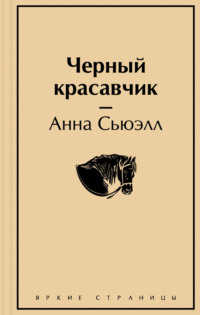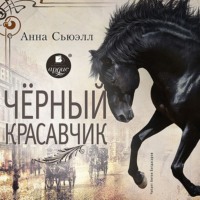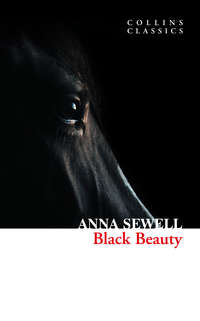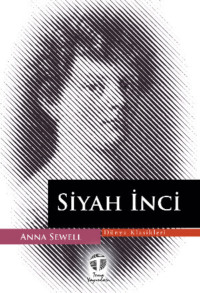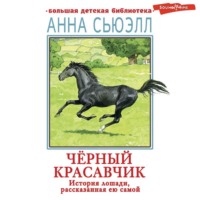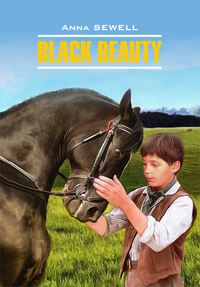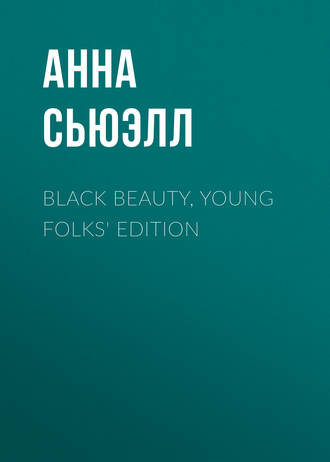 полная версия
полная версияBlack Beauty, Young Folks' Edition
In my old home I always knew that John and my master were my friends; but here, although in many ways I was well treated, I had no friend. York might have known, and very likely did know, how that rein harassed me; but I suppose he took it as a matter of course that could not be helped; at any rate, nothing was done to relieve me. ¸
CHAPTER XI
A HORSE FAIR
No doubt a horse fair is a very amusing place to those who have nothing to lose; at any rate, there is plenty to see.
Long strings of young horses out of the country, fresh from the marshes, and droves of shaggy little Welsh ponies, no higher than Merrylegs; and hundreds of cart horses of all sorts, some of them with their long tails braided up and tied with scarlet cord; and a good many like myself, handsome and high-bred, but fallen into the middle class, through some accident or blemish, unsoundness of wind, or some other complaint. There were some splendid animals quite in their prime, and fit for anything, they were throwing out their legs and showing off their paces in high style, as they were trotted out with a leading rein, the groom running by the side. But round in the background there were a number of poor things, sadly broken down with hard work, with their knees knuckling over and their hind legs swinging out at every step; and there were some very dejected-looking old horses, with the under-lip hanging down and the ears lying back heavily, as if there was no more pleasure in life, and no more hope; there were some so thin you might see all their ribs, and some with old sores on their backs and hips. These were sad sights for a horse to look upon, who knows not but he may come to the same state. ¸ I was put with some useful-looking horses, and a good many people came to look at us. The gentlemen always turned from me when they saw my broken knees; though the man who had me swore it was only a slip in the stall.
The first thing was to pull my mouth open, then to look at my eyes, then feel all the way down my legs and give me a hard feel of the skin and flesh, and then try my paces. It was wonderful what a difference there was in the way these things were done. Some did it in a rough, off-hand way, as if one was only a piece of wood; while others would take their hands gently over one's body, with a pat now and then, as much as to say, "By your leave." Of course, I judged a good deal of the buyers by their manners to myself.
There was one man, I thought, if he would buy me, I should be happy. He was not a gentleman. He was rather a small man, but well made, and quick in all his motions. I knew in a moment, by the way he handled me, that he was used to horses; he spoke gently, and his gray eye had a kindly, cheery look in it. It may seem strange to say—but it is true all the same—that the clean, fresh smell there was about him made me take to him; no smell of old beer and tobacco, which I hated, but a fresh smell as if he had come out of a hayloft. He offered twenty-three pounds for me; but that was refused, and he walked away. I looked after him, but he was gone, and a very hard-looking, loud-voiced man came. I was dreadfully afraid he would have me; but he walked off. One or two more came who did not mean business. Then the hard-faced man came back again and offered twenty-three pounds. A very close bargain was being driven, for my salesman began to think he should not get all he asked, and must come down; but just then the gray-eyed man came back again. I could not help reaching out my head toward him. He stroked my face kindly. "Well, old chap," he said, "I think we should suit each other. I'll give twenty-four for him."
"Say twenty-five, and you shall have him." ¸ "Twenty-four then," said my friend, in a very decided tone, "and not another sixpence—yes, or no?"
"Done," said the salesman; "and you may depend upon it there's a monstrous deal of quality in that horse, and if you want him for cab work he's a bargain."
The money was paid on the spot, and my new master took my halter, and led me out of the fair to an inn, where he had a saddle and bridle ready. He gave me a good feed of oats, and stood by while I ate it, talking to himself and talking to me. Half an hour after, we were on our way to London, through pleasant lanes and country roads, until we came into the great thoroughfare, on which we traveled steadily, till in the twilight we reached the great city. The gas lamps were already lighted; there were streets and streets crossing each other, for mile upon mile. I thought we should never ¸come to the end of them. At last, in passing through one, we came to a long cab stand, when my rider called out in a cheery voice, "Good-night, Governor!"
"Hallo!" cried a voice. "Have you got a good one?"
"I think so," replied my owner.
"I wish you luck with him."
"Thank ye, Governor," and he rode on. We soon turned up one of the side-streets, and about half-way up that we turned into a very narrow street, with rather poor-looking houses on one side, and what seemed to be coach-houses and stables on the other.
My owner pulled up at one of the houses and whistled. The door flew open, and a young woman, followed by a little girl and boy, ran out. There was a very lively greeting as my rider dismounted. "Now, then, Harry, my boy, open the gates, and mother will bring us the lantern."
The next minute they were all round me in the stable yard. "Is he gentle, father?" "Yes, Dolly, as gentle as your own kitten; come and pat him." At once the little hand was patting about all over my shoulder without fear. How good it felt!
"Let me get him a bran mash while you rub him down," said the mother. "Do, Polly, it's just what he wants; and I know you've got a beautiful mash ready for me."
I was led into a comfortable, clean-smelling stall with plenty of dry straw, and after a capital supper, I lay down, thinking I was going to be happy.
CHAPTER XII
A LONDON CAB HORSE
My new master's name was Jeremiah Barker, but as every one called him Jerry, I shall do the same. Polly, his wife, was just as good a match as a man could have. She was a plump, trim, tidy little woman, with smooth, dark hair, dark eyes, and a merry little mouth. The boy was nearly twelve years old, a tall, frank, good-tempered lad; and little Dorothy (Dolly they called her) was her mother over again, at eight years old. They were all wonderfully fond of each other; I never knew such a happy, merry family before or since. Jerry had a cab of his own, and two horses, which he drove and attended to himself. His other horse was a tall, white, rather large-boned animal, called Captain. He was old now, but when he was young he must have been splendid; he had still a proud way of holding his head and arching his neck; in fact, he was a high-bred, fine-mannered, noble old horse, every inch of him. He told me that in his early youth he went to the Crimean War; he belonged to an officer in the cavalry, and used to lead the regiment.
The next morning, when I was well-groomed, Polly and Dolly came into the yard to see me and make friends. Harry had been helping his father since the early morning, and had stated his opinion that I should turn out "a regular brick." Polly brought me a slice of apple, and Dolly a piece of bread, and made as much of me as if I had been the Black Beauty of olden time. It was a great treat to be petted again and talked to in a gentle voice, and I let them see as well as I could that I wished to be friendly. Polly thought I was very handsome, and a great deal too good for a cab, if it was not for the broken knees.¸
"Of course there's no one to tell us whose fault that was," said Jerry, "and as long as I don't know I shall give him the benefit of the doubt; for a firmer, neater stepper I never rode. We'll call him Jack, after the old one—shall we, Polly?"
"Do," she said, "for I like to keep a good name going."
Captain went out in the cab all the morning. Harry came in after school to feed me and give me water. In the afternoon I was put into the cab. Jerry took as much pains to see if the collar and bridle fitted comfortably as if he had been John Manly over again. There was no check-rein, no curb, nothing but a plain ring snaffle. What a blessing that was!
After driving through the side-street we came to the large cabstand where Jerry had said "Good-night." On one side of this wide ¸street were high houses with wonderful shop fronts, and on the other was an old church and churchyard, surrounded by iron palisades. Alongside these iron rails a number of cabs were drawn up, waiting for passengers; bits of hay were lying about on the ground; some of the men were standing together talking; some were sitting on their boxes reading the newspaper; and one or two were feeding their horses with bits of hay, and giving them a drink of water. We pulled up in the rank at the back of the last cab. Two or three men came round and began to look at me and pass their remarks.
"Very good for a funeral," said one.
"Too smart-looking," said another, shaking his head in a very wise way; "you'll find out something wrong one of these fine mornings, or my name isn't Jones."
"Well," said Jerry pleasantly, "I suppose I need not find it out till it find me out, eh? And if so, I'll keep up my spirits a little longer."
Then there came up a broad-faced man, dressed in a great gray coat with great gray capes and great white buttons, a gray hat, and a blue comforter loosely tied around his neck; his hair was gray, too; but he was a jolly-looking fellow, and the other men made way for him. He looked me all over, as if he had been going to buy me; and then straightening himself up with a grunt, he said, "He's the right sort for you, Jerry; I don't care what you gave for him, he'll be worth it." Thus my character was established on the stand. This man's name was Grant, but he was called "Gray Grant," or "Governor Grant." He had been the longest on that stand of any of the men, and he took it upon himself to settle matters and stop disputes.
The first week of my life as a cab horse was very trying. I had never been used to London, and the noise, the hurry, the crowds of horses, carts, and carriages, that I had to make my way through, made me feel anxious and harassed; but I soon found that I could ¸perfectly trust my driver, and then I made myself easy, and got used to it.
Jerry was as good a driver as I had ever known; and what was better, he took as much thought for his horses as he did for himself. He soon found out that I was willing to work and do my best; and he never laid the whip on me, unless it was gently drawing the end of it over my back, when I was to go on; but generally I knew this quite well by the way in which he took up the reins; and I believe his whip was more frequently stuck up by his side than in his hand.
In a short time I and my master understood each other, as well as horse and man can do. In the stable, too, he did all that he could ¸for our comfort. The stalls were the old-fashioned style, too much on the slope; but he had two movable bars fixed across the back of our stalls, so that at night, when we were resting, he just took off our halters and put up the bars, and thus we could turn about and stand whichever way we pleased, which is a great comfort.
Jerry kept us very clean, and gave us as much change of food as he could, and always plenty of it; and not only that, but he always gave us plenty of clean fresh water, which he allowed to stand by us both night and day, except of course when we came in warm. Some people say that a horse ought not to drink all he likes; but I know if we are allowed to drink when we want it we drink only a little at a time, and it does us a great deal more good than swallowing down half a bucketful at a time because we have been left without till we are thirsty and miserable. Some grooms will go home to their beer and leave us for hours with our dry hay and oats and nothing to moisten them; then of course we gulp down too much at once, which helps to spoil our breathing and sometimes chills our stomachs. But the best thing that we had here was our Sundays for rest! we worked so hard in the week, that I do not think we could have kept up to it, but for that day; besides, we had then time to enjoy each other's company.
CHAPTER XIII
DOLLY AND A REAL GENTLEMAN
The winter came in early, with a great deal of cold and wet. There was snow, or sleet, or rain, almost every day for weeks, changing only for keen driving winds or sharp frosts. The horses all felt it very much. When it is a dry cold, a couple of good thick rugs will keep the warmth in us; but when it is soaking rain, they soon get wet through and are no good. Some of the drivers had a waterproof cover to throw over, which was a fine thing; but some of the men were so poor that they could not protect either themselves or their horses, and many of them suffered very much that winter. When we horses had worked half the day we went to our dry stables, and could rest; while they had to sit on their boxes, sometimes staying out as late as one or two o'clock in the morning, if they had a party to wait for.
When the streets were slippery with frost or snow, that was the worst of all for us horses; one mile of such traveling with a weight to draw, and no firm footing, would take more out of us than four on a good road; every nerve and muscle of our bodies is on the strain to keep our balance; and, added to this, the fear of falling is more exhausting than anything else. If the roads are very bad, indeed, our shoes are roughed, but that makes us feel nervous at first.
One cold windy day, Dolly brought Jerry a basin of something hot, and was standing by him while he ate it. He had scarcely begun, when a gentleman, walking toward us very fast, held up his umbrella. Jerry touched his hat in return, gave the basin to Dolly, and was taking off my cloth, when the gentleman, hastening up, cried out, "No, no, finish your soup, my friend; I have not much time to spare, but I can wait till you have done, and set your little girl safe on the pavement."
So saying, he seated himself in the cab. Jerry thanked him kindly, and came back to Dolly. "There, Dolly, that's a gentleman; that's a real gentleman, Dolly; he has got time and thought for the comfort of a poor cabman and a little girl."
Jerry finished his soup, set the child across, and then took his orders to drive to Clapham Rise. Several times after that, the same gentleman took our cab. I think he was very fond of dogs and horses, for whenever we took him to his own door, two or three dogs ¸would come bounding out to meet him. Sometimes he came round and patted me saying in his quiet, pleasant way: "This horse has got a good master, and he deserves it." It was a very rare thing for any one to notice the horse that had been working for him. I have known ladies to do it now and then, and this gentleman, and one or two others have given me a pat and a kind word; but ninety-nine out of a hundred would as soon think of patting the steam engine that drew the train.
One day, he and another gentleman took our cab; they stopped at a shop in R– Street, and while his friend went in, he stood at the door. A little ahead of us on the other side of the street, a cart with two very fine horses was standing before some wine vaults; the carter was not with them, and I cannot tell how long they had been standing, but they seemed to think they had waited long enough, and began to move off. Before they had gone, many paces, the carter came running out and caught them. He seemed furious at their having moved, and with whip and rein punished them brutally, even beating them about the head. Our gentleman saw it all, and stepping quickly across the street, said in a decided voice: "If you don't stop that directly, I'll have you arrested for leaving your horses, and for brutal conduct."
The man, who had clearly been drinking, poured forth some abusive language, but he left off knocking the horses about, and taking the reins, got into his cart; meantime our friend had quietly taken a notebook from his pocket, and looking at the name and address painted on the cart, he wrote something down.
"What do you want with that?" growled the carter, as he cracked his whip and was moving on. A nod and a grim smile was the only answer he got.
On returning to the cab, our friend was joined by his companion, who said laughing, "I should have thought, Wright, you had enough business of your own to look after, without troubling yourself about other people's horses and servants."
Our friend stood still for a moment, and throwing his head a little back, "Do you know why this world is as bad as it is?"
"No," said the other.
"Then I'll tell you. It is because people think only about their own business, and won't trouble themselves to stand up for the oppressed, nor bring the wrong-doer to light. I never see a wicked ¸thing like this without doing what I can, and many a master has thanked me for letting him know how his horses have been used."
"I wish there were more gentlemen like you, sir," said Jerry, "for they are wanted badly enough in this city."
CHAPTER XIV
POOR GINGER
One day, while our cab and many others were waiting outside one of the parks where music was playing, a shabby old cab drove up beside ours. The horse was an old worn-out chestnut, with an ill-kept coat, and bones that showed plainly through it, the knees knuckled over, and the fore-legs were very unsteady. I had been eating some hay, and the wind rolled a little lock of it that way, and the poor creature put out her long thin neck and picked it up, and then turned round and looked about for more. There was a hopeless look in the dull eye that I could not help noticing, and then, as I was thinking where I had seen that horse before, she looked full at me and said, "Black Beauty, is that you?"
It was Ginger! but how changed! The beautifully arched and glossy neck was now straight, and lank, and fallen in; the clean, straight legs and delicate fetlocks were swelled; the joints were grown out of shape with hard work; the face, that was once so full of spirit and life, was now full of suffering, and I could tell by the heaving of her sides, and her frequent cough, how bad her breath was. ¸ Our drivers were standing together a little way off, so I sidled up to her a step or two, that we might have a little quiet talk. It was a sad tale that she had to tell.
After a twelvemonth's run off at Earlshall, she was considered to be fit for work again, and was sold to a gentleman. For a little while she got on very well, but after a longer gallop than usual, the old strain returned, and after being rested and doctored she was again sold. In this way she changed hands several times, but always getting lower down.
"And so at last," said she, "I was bought by a man who keeps a number of cabs and horses, and lets them out. You look well off, and I am glad of it, but I could not tell you what my life has been. When they found out my weakness, they said I was not worth what they gave for me, and that I must go into one of the low cabs, and just be used up; that is what they are doing, whipping and working with never one thought of what I suffer—they paid for me, and must get it out of me, they say. The man who hires me now pays a deal of money to the owner every day, and so he has to get it out of ¸me, too; and so it's all the week round and round, with never a Sunday rest."
I said, "You used to stand up for yourself if you were ill-used."
"Ah!" she said, "I did once, but it's no use; men are strongest, and if they are cruel and have no feeling, there is nothing that we can do but just bear it—bear it on and on to the end. I wish the end was come, I wish I was dead. I have seen dead horses, and I am sure they do not suffer pain."
I was very much troubled, and I put my nose up to hers, but I could say nothing to comfort her. I think she was pleased to see me, for she said, "You are the only friend I ever had."
Just then her driver came up, and with a tug at her mouth, backed her out of the line and drove off, leaving me very sad, indeed.
A short time after this, a cart with a dead horse in it passed our cab stand. The head hung out of the cart tail, the lifeless tongue was slowly dropping with blood; and the sunken eyes! but I can't speak of them, the sight was too dreadful! It was a chestnut horse with a long, thin neck. I saw a white streak down the forehead. I believe it was Ginger; I hoped it was, for then her troubles would be over. Oh! if men were more merciful, they would shoot us before we came to such misery.
CHAPTER XV
At a sale I found myself in company with a lot of horses—some lame, some broken-winded, some old, and some that I am sure it would have been merciful to shoot.
The buyers and sellers, too, many of them, looked not much better off than the poor beasts they were bargaining about. There were poor old men, trying to get a horse or pony for a few pounds, that might drag about some little wood or coal cart. There were poor men trying to sell a worn-out beast for two or three pounds, rather than have the greater loss of killing him. Some of them looked as if poverty and hard times had hardened them all over; but there were others that I would have willingly used the last of my strength in serving; poor and shabby, but kind and humane, with voices that I could trust. There was one tottering old man that took a great fancy to me, and I to him, but I was not strong enough—it was an anxious time! Coming from the better part of the fair, I noticed a man who looked like a gentleman farmer, with a young boy by his side; he had a broad back and round shoulders, a kind, ruddy face, and he wore a broad-brimmed hat. When he came up to me and my companions, he stood still, and gave a pitiful look round upon¸ us. I saw his eye rest on me; I had still a good mane and tail, which did something for my appearance. I pricked my ears and looked at him.
"There's a horse, Willie, that has known better days."
"Poor old fellow!" said the boy; "do you think, grandpapa, he was ever a carriage horse?"
"Oh, yes! my boy," said the farmer, coming closer, "he might have been anything when he was young; look at his nostrils and his ears, the shape of his neck and shoulder; there's a deal of breeding about that horse." He put out his hand and gave me a kind pat on the neck. I put out my nose in answer to his kindness; the boy stroked my face.
"Poor old fellow! see, grandpapa, how well he understands kindness. Could not you buy him and make him young again as you did with Ladybird?"
"My dear boy, I can't make all old horses young; besides, Ladybird was not so very old, as she was run down and badly used."
"Well, grandpapa, I don't believe that this one is old; look at his mane and tail. I wish you would look into his mouth, and then you could tell; though he is so very thin, his eyes are not sunk like some old horses." The old gentleman laughed. "Bless the boy! he is as horsey as his old grandfather."
"But do look at his mouth, grandpapa, and ask the price; I am sure he would grow young in our meadows."
The man who had brought me for sale now put in his word. "The young gentleman's a real knowing one, sir. Now, the fact is, this 'ere hoss is just pulled down with over-work in the cabs; he's not an old one, and I heard as how the vetenary said that a six-months' run off would set him right up, being as how his wind was not broken. I've had the tending of him these ten days past, and a gratefuller, pleasanter animal I never met with, and 'twould be worth a gentleman's while to give a five-pound note for him, and ¸let him have a chance. I'll be bound he'd be worth twenty pounds next spring."
The old gentleman laughed, and the little boy looked up eagerly. "O, grandpapa, did you not say the colt sold for five pounds more than you expected? You would not be poorer if you did buy this one."
The farmer slowly felt my legs, which were much swelled and strained; then he looked at my mouth. "Thirteen or fourteen, I should say; just trot him out, will you?"
I arched my poor thin neck, raised my tail a little and threw out my legs as well as I could, for they were very stiff.
"What is the lowest you will take for him?" said the farmer as I came back. "Five pounds, sir; that was the lowest price my master set."
"'Tis a speculation," said the old gentleman, shaking his head, but at the same time slowly drawing out his purse, "quite a speculation! Have you any more business here?" he said, counting the sovereigns into his hand. "No, sir, I can take him for you to the inn, if you please."


